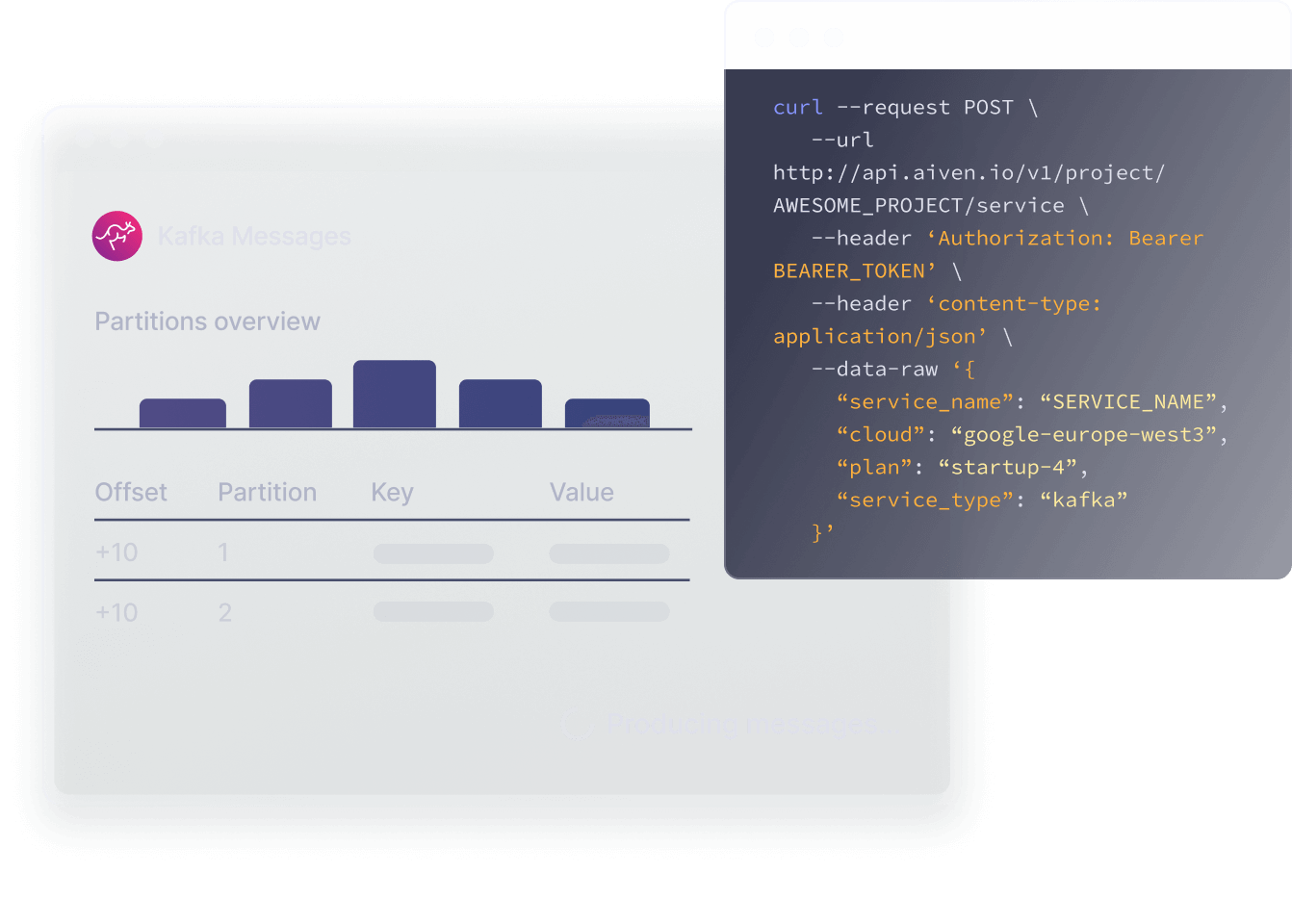Aiven for Apache Kafka®
A better approach to managed Kafka
Get complete control in any cloud with Aiven for Apache Kafka's fully managed, enterprise-grade streaming service.
99.99% SLA
50+ connectors
Runs on any cloud
Start for free
Includes $300 in free credits
Trusted by developers at


























Aiven for Kafka: A Head to Head Comparison
Aiven for Apache Kafka is designed from the ground up to deliver transparency, automation, and seamless integration across any cloud. Built to avoid the operational overhead, vendor lock-in, and unpredictable costs of proprietary platforms like Confluent.
Feature | Aiven | Confluent | Why it matters |
|---|---|---|---|
Predictable TCO | Aiven's pricing provides clear and predictable costs, allowing for accurate budget forecasting and a lower Total Cost of Ownership. | ||
Bring Your Own Cloud (BYOC) | Aiven offers a true Bring Your Own Cloud (BYOC) model, giving organizations the best control over their cloud environment, data residency, and security posture. Complete freedom to deploy Kafka in any public cloud with multi-cloud approach that ensures you're never locked into a single provider. | ||
Commitment to Open Source | Aiven is built on 100% open-source technologies and actively contributes to the community, giving customers the freedom and flexibility to avoid vendor lock-in. Not just Kafka, but Kafka's entire open-source ecosystem - Connect, MirrorMaker 2, Schema Registry, and all essential components in one unified platform. | ||
Powered by Diskless Kafka | Aiven offers Open Source Diskless Kafka topics for BYOC customers that can cut your cross AZ data replication costs by as much as 80%. Confluent’s Diskless Offering is proprietary and only available at cluster level without the flexibility of both low latency and diskless topics in the same cluster. | ||
Optimised Provisioning | Aiven delivers opinionated Kafka with all the capabilities you love - legendary performance, retention, and replay. Pick throughput, retention, and replication tiers and click go. Get a secure, properly-sized cluster in seconds. | ||
Scalable Growth | Aiven's architecture and transparent pricing model are designed to support cost-effective growth, allowing businesses to scale their operations seamlessly and affordably. | ||
All-Inclusive Pricing | Aiven's all-inclusive pricing model bundles networking and other costs into a single, transparent price, simplifying budget management and eliminating surprise fees. | ||
Unified Open Source Platform | Aiven provides a unified platform where the best open-source services like PostgreSQL and OpenSearch can be easily integrated, creating a powerful and flexible data ecosystem. | ||
Open Data Governance | Aiven empowers customers with open data governance by supporting and contributing to open-source tools like Klaw, ensuring control over data policies without proprietary constraints. |
Enjoy high availability even with the smallest plan
Startup
starting from$200/month
$0.27/hour- 3 dedicated VMs
- 1 CPU per VM
- 2-4 GB RAM per VM
- 90 GB total cluster storage
Business
starting from$500/month
$0.69/hour- 3 dedicated VMs
- 1-8 CPU per VM
- 4-32 GB RAM per VM
- 600-18432 GB total cluster storage
- Everything in Startup, plus support for Kafka Connect in the same cluster
Add-ons
Premium
starting from$1,900/month
$2.60/hour- 6-30 dedicated VMs
- 2-8 CPU per VM
- 8-32 GB RAM per VM
- 2250-184320 GB total cluster storage
- Everything in Business, plus more compute and storage capacity
Add-ons
Need help? Use our Pricing Calculator to get a recommended plan based on your unique data needs and requirements.
Data retention is only limited by storage, with the exception of Free plan. For information about annual discount or plan capacity beyond the listed plans, please contact us
Network & Data Transfer
Networking is metered based on consumption. For accounts on classic plans, usage is included whilst meeting our fair usage policy to ensure platform stability.
For high-volume streaming requirements or to view current network rates, please contact Sales.
Why choose Aiven for Kafka
Built on 100% open-source Kafka, Aiven eliminates complexity, reduces cost, and offers the flexibility modern teams need to scale quickly without lock-in.
And, unlike proprietary platforms that add operational overhead, vendor lock-in, and unpredictable costs, Aiven is designed from the ground up to deliver transparency, automation, and seamless integration across your cloud environment.
Simplified Operations
Automatic updates and upgrades. Zero stress. Fully managed Kafka reduces engineering effort, allowing teams to focus on innovation.
Mature Ecosystem
An ecosystem allowing schema management, enterprise integration, and data
synchronization.
Cost Optimization
Predictable pricing, efficient resource allocation, and BYOC help control expenses and reduce total cost of ownership (TCO).
Aiven’s Committed to Open Source
Aiven not only offers Open Source we also contribute to the community by making key features available and sustainable, like tiered storage.
Enterprise Reliability
99.99% uptime SLA, automated failover, and self-healing infrastructure ensure business continuity with dedicated, experienced support staff.
Streamlined Solutions
Easily integrate Kafka with any of our other services, like ClickHouse or OpenSearch, for a single pane of glass, simplifying your platform and data operations.
How our customers use Apache Kafka
Aiven’s customers unlock major cloud savings and full control with it's BYOC (Bring Your Own Cloud) model.








